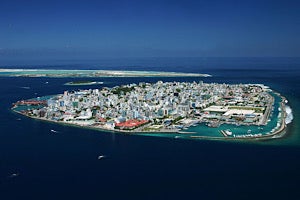Summary
Like many other countries, COVID-19 has also caused a public health emergency in the Maldives. The small island nation has received external assistance to help it to deal with this pandemic. However, in the long term, its economy will be severely affected by this global menace.
The well-off and developed countries of the world have suffered severely due to the global outbreak of COVID-19. However, the smaller and less developed countries will eventually count the cost of the outbreak the most, as they do not have enough resources to fight this pandemic. One such small economy is the Maldives, which recorded its first positive case on 6 March 2020 and has so far reported 19 cases of infected persons (as on 4 April 2020).
Measures to deal with the Impact
In an effort to deal with the pandemic, on 12 March 2020, the Maldives’ Health Minister, Abdulla Ameen, declared a public health emergency for a 30-day period across the country. Under this emergency, the state could take measures such as:
i. Vaccinate people;
ii. Determine the distribution of vaccines, medicines and other related medical materials based on the urgency of need by different groups of people;
iii. Shut down educational institutions and prohibit any public gatherings;
iv. Provide assistance and resource to people in quarantine; and
v. Impose travel restrictions and bans, including via land, sea and air.
Using powers under the public health emergency law, the Maldivian government has temporarily banned all incoming and outgoing travels. Also, all schools, colleges, and offices have been closed. As COVID-19 is mainly seen as an imported infection, on 11 March 2020, the government set up a dedicated COVID-19 clinic for migrant workers on Hulhumale Island. There are about 100,000 migrant workers in the Maldives.
One of the major sufferers from the COVID-19 infection is the tourism sector which is the backbone of the Maldives economy. By the end of 2019, the Maldives received about 1.7 million tourists and was aiming to reach the two-million mark in 2020. However, this pandemic has ruined its plans. It is estimated that, by March 2020, there has already been a 22.8-per cent decline in tourists, compared to the same period last year. The period between 26 January and 12 March 2020 recorded cancellation of around 161,740 travel bookings to the Maldives. Due to COVID-19, it is estimated that there will be a decline of between 12 and 35 per cent in tourist arrivals to the Maldives in 2020, compared to 2019.
Other sectors of the Maldivian economy have also been affected due to COVID-19. Fear has been looming among employees and workers about their salaries and wages. To allay such fears, in his address to the nation on 12 March 2020, the Maldives’ President, Ibrahim Mohamed Solih stated, “The government has no intention to reduce the wages of government employees nor has any intention to halt any development project that has already been initiated.” Later, to reduce the economic impact of COVID-19 on the country’s economy, Solih announced some measures such as the injection of a stimulus package worth 2.5 billion Maldivian Rufiyaa (S$23.3 million) into the Maldivian economy; modification of the Bank of Maldives loan repayment structure, putting a moratorium of six months on all loan repayments and extension of repayments terms amongst several other waivers; and to provide financial assistance to businesses through loan schemes. Solih also announced a moratorium of six months on the repayment of housing loans under the Housing Development Finance Corporation.
Assistance to the Maldives to fight COVID-19
In an effort to assist the Maldivian health workers fight against COVID-19, India sent a team of health experts consisting anesthesiologists, pulmonologists, physicians and laboratory technicians to the Maldives. India also provided essential medicines to help the Maldives. Moreover, seven Maldivians were evacuated from Wuhan City, China with the assistance of the Indian government. On 27 March 2020, the Chinese Ambassador to the Maldives, Zhang Lizhong, handed over aid materials such as masks, gloves, stethoscopes, goggles and protective suits to the Maldivian Foreign Minister, Abdulla Shahid. These items were courtesy of China’s Yunnan provincial government.
Besides the two Asian powers, the World Bank has provided an aid of US$10 million (S$14.35 million) to the Maldives. The country has also received assistance from the Asian Development Bank (ADB), which approved a US$500,000 (S$717,790) grant from its Asia Pacific Disaster Response Fund to finance the government’s response to COVID-19. This assistance is on top of a US$100,000 (S$143,558) technical assistance grant provided by the ADB to the Maldives as an initial emergency support. Despite its fragile economy, the Maldives has pledged US$200,000 (S$287,125) to the South Asian Association for Regional Cooperation’s COVID-19 Emergency Fund, set up on the initiative of India’s Prime Minister Narendra Modi. The fund will be used to fight COVID-19 in South Asia.
Conclusion
While the number of COVID-19 positive cases in the Maldives is small at the moment, it is expected to increase in the days and months to come. Ultimately, its economy will face the brunt of this pandemic. External assistance may help to alleviate some of the Maldives’s problems. However, that will only add to its already huge debt.
. . . . .
Dr Amit Ranjan is Research Fellow at the Institute of South Asian Studies (ISAS), an autonomous research institute at the National University of Singapore (NUS). He can be contacted at isasar@nus.edu.sg. The author bears full responsibility for the facts cited and opinions expressed in this paper.
Photo courtesy: By Shahee Ilyas – Own work, CC BY-SA 3.0, https://commons.wikimedia.org/w/index.php?curid=621195
-
 More From :
More From :
-
 Tags :
Tags :
-
 Download PDF
Download PDF



